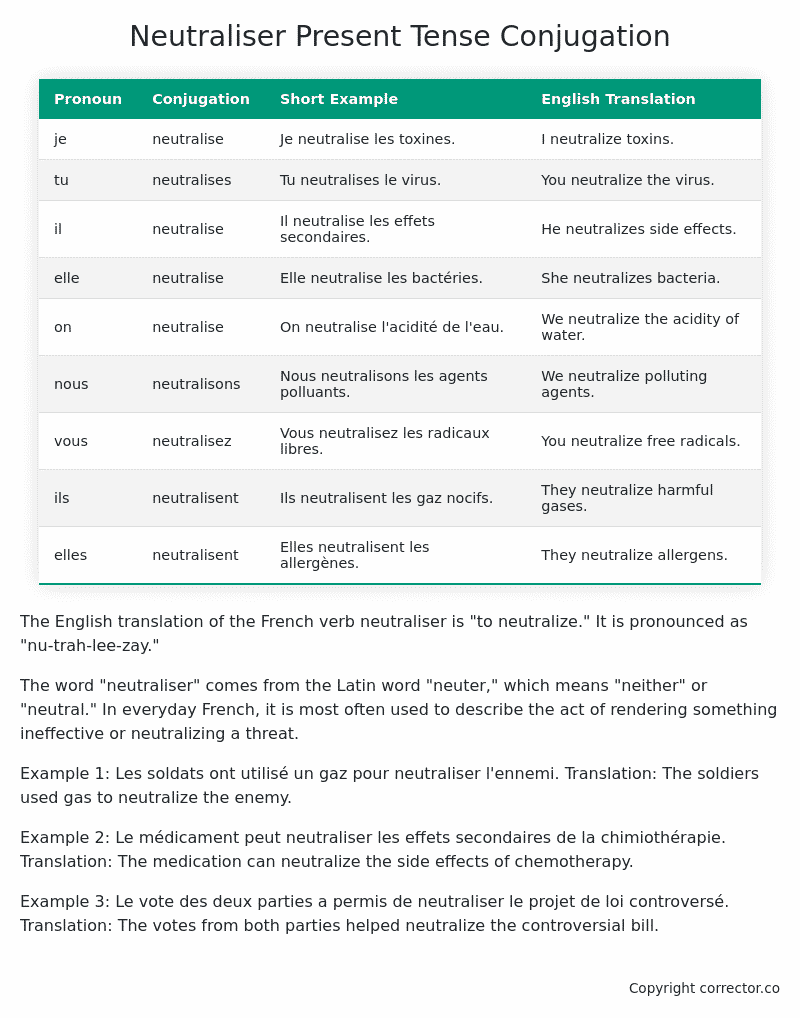Le Present (Present Tense) Conjugation of the French Verb neutraliser
Introduction to the verb neutraliser
The English translation of the French verb neutraliser is “to neutralize.” It is pronounced as “nu-trah-lee-zay.”
The word “neutraliser” comes from the Latin word “neuter,” which means “neither” or “neutral.” In everyday French, it is most often used to describe the act of rendering something ineffective or neutralizing a threat.
Example 1: Les soldats ont utilisé un gaz pour neutraliser l’ennemi.
Translation: The soldiers used gas to neutralize the enemy.
Example 2: Le médicament peut neutraliser les effets secondaires de la chimiothérapie.
Translation: The medication can neutralize the side effects of chemotherapy.
Example 3: Le vote des deux parties a permis de neutraliser le projet de loi controversé.
Translation: The votes from both parties helped neutralize the controversial bill.
Neutraliser – About the French Present Tense
To take a deep dive into all the French tenses then see our article on Mastering French Tense Conjugation.
Common Everyday Usage Patterns For Le Present
Interactions with Other Tenses
Table of the Present Tense Conjugation of neutraliser
| Pronoun | Conjugation | Short Example | English Translation |
|---|---|---|---|
| je | neutralise | Je neutralise les toxines. | I neutralize toxins. |
| tu | neutralises | Tu neutralises le virus. | You neutralize the virus. |
| il | neutralise | Il neutralise les effets secondaires. | He neutralizes side effects. |
| elle | neutralise | Elle neutralise les bactéries. | She neutralizes bacteria. |
| on | neutralise | On neutralise l’acidité de l’eau. | We neutralize the acidity of water. |
| nous | neutralisons | Nous neutralisons les agents polluants. | We neutralize polluting agents. |
| vous | neutralisez | Vous neutralisez les radicaux libres. | You neutralize free radicals. |
| ils | neutralisent | Ils neutralisent les gaz nocifs. | They neutralize harmful gases. |
| elles | neutralisent | Elles neutralisent les allergènes. | They neutralize allergens. |
Other Conjugations for Neutraliser.
Le Present (Present Tense) Conjugation of the French Verb neutraliser (this article)
Imparfait (Imperfect) Tense Conjugation of the French Verb neutraliser
Passé Simple (Simple Past) Tense Conjugation of the French Verb neutraliser
Passé Composé (Present Perfect) Tense Conjugation of the French Verb neutraliser
Futur Simple (Simple Future) Tense Conjugation of the French Verb neutraliser
Futur Proche (Near Future) Tense Conjugation of the French Verb neutraliser
Plus-que-parfait (Pluperfect) Tense Conjugation of the French Verb neutraliser
Passé Antérieur (Past Anterior) Tense Conjugation of the French Verb neutraliser
Futur Antérieur (Future Anterior) Tense Conjugation of the French Verb neutraliser
Subjonctif Présent (Subjunctive Present) Tense Conjugation of the French Verb neutraliser
Subjonctif Passé (Subjunctive Past) Tense Conjugation of the French Verb neutraliser
Subjonctif Imparfait (Subjunctive Imperfect) Tense Conjugation of the French Verb neutraliser
Conditionnel Présent (Conditional Present) Tense Conjugation of the French Verb neutraliser
Conditionnel Passé (Conditional Past) Tense Conjugation of the French Verb neutraliser
L’impératif Présent (Imperative Present) Tense Conjugation of the French Verb neutraliser
L’infinitif Présent (Infinitive Present) Tense Conjugation of the French Verb neutraliser
Struggling with French verbs or the language in general? Why not use our free French Grammar Checker – no registration required!
Get a FREE Download Study Sheet of this Conjugation 🔥
Simply right click the image below, click “save image” and get your free reference for the neutraliser Present Tense tense conjugation!

I hope you enjoyed this article on the verb neutraliser. Still in a learning mood? Check out another TOTALLY random French verb present conjugation!


